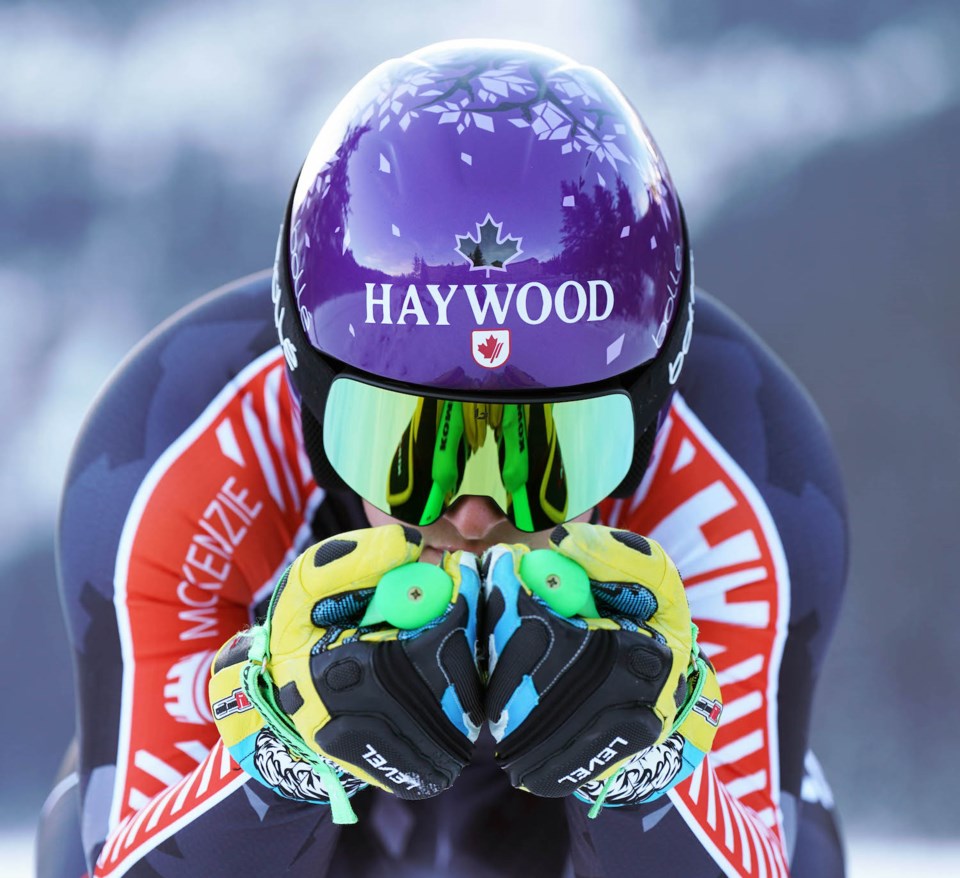When Brodie Seger hits the slopes this year, one talented individual will—once again—recognize their handiwork upon his head.
Seger is bringing back his Helmet for Hope artwork competition, which again invites members of the public to design his race helmet. The winner will receive $1,000 from Haywood Securities and get to watch Seger race with their design in each FIS World Cup event of the imminent season.
In doing so, the Team Canada alpine skier is fundraising for the ALS Society of BC’s Project Hope, which aims to fuel breakthroughs in the ongoing medical research against amyotrophic lateral sclerosis.
Known commonly as ALS, the disease is a neurological affliction that decays nerve cells in the brain and spinal cord responsible for controlling voluntary muscle movement. Patients eventually lose the ability to perform basic motor functions, including breathing.
Skin in the game
Seger’s father, Mark, was diagnosed with ALS more than 10 years ago. He has done more than simply fight the illness—he has lived with it displaying a rare amount of genuine poise and positivity. In so doing, Mark has inspired everyone around him, including his two sons on the Canadian national ski team.
“My dad always taught me and my brother [Riley] to take the positives out of every situation as we started racing—dealing with the ups and downs, the heartbreak of bad results, the nerves before races and things like that,” Seger explained. “Since being diagnosed with ALS and the inevitable decline that comes along with that, it's been extremely powerful to witness how he has exemplified that positive attitude throughout the entire journey.”
Rarely, if ever, has Mark given in to self-pity. Instead, he makes the most of each day, supporting his family and engaging in his favourite sports of biking and skiing until he could physically manage it no longer. At some point, Seger realized his platform as an athlete could be deployed to effect change, and he chose to take action.
The question then became: what to do? The 27-year-old wasn’t content with simply raising awareness. He wanted to make a real difference, and it takes money to do that. Helmet artwork came to mind, as many professional skiers rock custom paint jobs for various reasons.
“But how do I do something that makes people feel like they have some skin in the game?” Seger remembers wondering. “Then the idea of the competition came to me, because maybe if people are having to put some thought into the design, and then the winner gets to actually see their design on my helmet, it might just get them a little bit more interested in following along with the season.”
He didn’t know how it would unfold—whether he would get two submissions for artwork or 50. Fortunately, Helmet for Hope took off.
“It was just incredible to see that when you put yourself out there, trying to do a good thing for the world, people get behind you,” Seger said. “Not just the ski community, but it extended to so many others reaching out from all around Vancouver and across the province—telling me their stories and how ALS has affected their lives.”
Project Hope
It’s debilitating enough to face a disease that rots your muscles, but ALS patients in British Columbia deal with a variety of additional challenges, too. For instance, clinical trials pertinent to the ailment have not historically been available in-province due to a lack of research facilities.
Project Hope and its backers are gradually making some much-needed changes. The initiative established a new ALS treatment centre on-campus at the University of British Columbia: a brighter and better-equipped location compared to its predecessor at the GF Strong Rehabilitation Centre. This facility is a nexus for all kinds of research on neurodegenerative conditions like Parkinson’s disease and multiple sclerosis (MS) in addition to ALS.
Earlier this summer, the project brought in a lead clinician and scientist, Dr. Erik Pioro, to spearhead its efforts to find the cause and cure for ALS. Seger says the goal is to have clinical trials available beginning February 2024.
“I think it's been really cool to see progress happen in the time that I've been involved with this whole fundraising initiative,” he added. “I really hope that it makes the people who have supported this whole thing feel like it's paying off and moving in the right direction.”
Seger himself hopes to get moving in the right direction after tearing his ACL and meniscus at the 2023 World Championships—the same event in which Jack Crawford and Cameron Alexander both earned hardware a few months ago. Seger has progressed well in his rehab and looks forward to rejoining his Whistler Mountain Ski Club teammates at the highest level of their sport.
Helmet for Hope contest submissions close on Oct. 29, but those willing to support continuing ALS research in B.C. can donate to Seger’s fundraising page at alsbc.ca/2023-helmet4hope-annual-fundraising-campaign all winter long.




